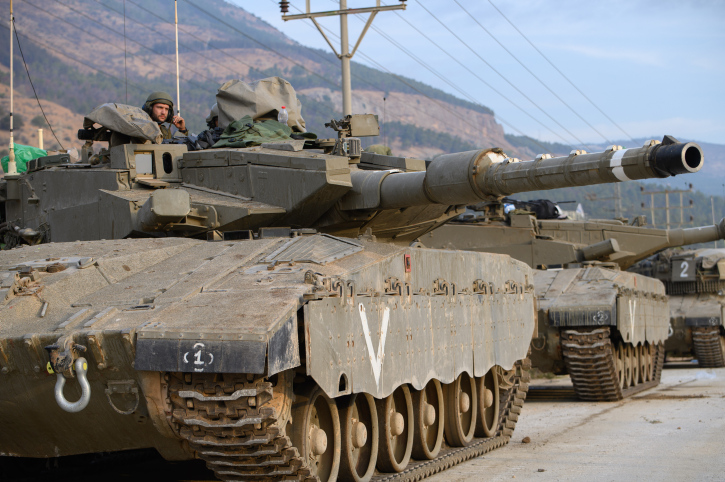If Israel does launch a ground war, how deep into the Lebanese territory would it reach?
By Anna Epshtein, TPS
Hezbollah leaders have repeatedly vowed to prevent 60,000 evacuated residents of northern Israel to return to their homes, prompting escalating rocket attacks and Israeli airstrikes — all raising the likelihood of a ground invasion of Lebanon.
Experts described to The Press Service of Israel different war scenarios but stressed that a ground operation could be avoided.
Israel’s escalating airstrikes “Are not preparation for a ground op, it’s a way to escape it,” Professor Kobi Michael, a senior researcher at Tel Aviv University’s Institute for National Security Studies, told TPS-IL.
Israel is demonstrating its capabilities, showing it is not afraid of war in order to make Hezbollah agree to a diplomatic solution,” he said.
Echoing that point, Yaakov Lappin, a research fellow at the Alma Research Institute and a military analyst for the Jewish News Syndicate told TPS-IL, ‘What is happening now is an Israeli ultimatum to Hezbollah, and also to Iran. The ultimatum says that the phase of the war of attrition is over, and now Nasrallah and Khamenei must decide – a ceasefire in the north or a full-scale war.”
The Litani River
If Israel does launch a ground war, how deep into the Lebanese territory would it reach?
“The Litani River is a natural border,’ said Prof. Eyal Zisser, a vice-rector of Tel Aviv university and a senior research fellow at Moshe Dayan Center for Middle Eastern Studies.
The Litani is Lebanon’s longest river, originating near the city of Baalbek, following the Beqaa Valley south before turning west and reaching the Mediterranean near the city of Tyre.
According to United Nations Security Council Resolution 1701, which ended the 2006 Second Lebanon War, Hezbollah is forbidden from operating south of the Litani.
However, Israel may decide to go deeper into Lebanese territory.
There are two possible scenarios, said Prof. Eitan Shamir, managing director of the Begin-Sadat Center for Strategic Studies, who lectures on political science at Bar-Ilan University.
He is also a former head of the national security doctrine department in the Israel Ministry of Strategic Affairs.
“In scenario A, the ground op will be a very limited one, where Israel does not cross the Litani river. The goal is to move Hezbollah from the border and to let the residents of the Israeli north to get back home,” Shamir said.
“This will not help against the rockets, because the rockets are launched from deeper inside Lebanon. But first, there will be no anti-tank missiles,” he added. “And secondly, Hezbollah won’t sit on the fence, threatening the Israeli residents with an October 7-like invasion.”
Scenario B, Shamir explained, would be a riskier, larger scale invasion reaching Beirut to destroy Hezbollah’s military capabilities as much as possible.
“Like we did to Hamas in Gaza,” he said.
But according to Michael, once Israeli soldiers cross the Lebanese border, a “limited operation” will not be an option.
“If a ground operation starts, it means an all-out war, and the goal of it will be to critically hurt Hezbollah, as well as to destroy the terrorist infrastructure in Lebanon,” Michael insisted.
‘It Needs to Be Done Quicker’
Most of the analysts agreed that it would take anywhere from three weeks to three months for Israel to create a security zone in Lebanon to enable norther residents to return home.
“We can’t allow another 11 months to deal with Hezbollah in the north,” Michael stressed. “It needs to be done quicker.”
Lappin said an invasion’s first phase would be “an intensive attack on Hezbollah’s capabilities, military forces, launchers, operatives, tunnels, bunkers, command and control centers, while dealing with Hezbollah’s defense lines and territorial unit.”
The second phase, said Lappin would deal with eliminating Hezbollah’s attempts to rebuild, which could take at least six months.
Asked about exit strategies, the analysts agreed that Israel would need to ensure that Hezbollah is not able to cross the Litani again.
“The question is not when we leave Lebanon, but what the day after will look like,” said Zisser.
According to Lappin, leaving Lebanon will depend on resolving who enforces Security Council Resolution 1701. The United Nations Interim Force in Lebanon, he added, “has utterly failed in enforcing this.”
Said Michael, “You don’t need to stay in the security zone forever to ensure it’s quiet there. The army can enter it whenever necessary, based on intelligence – as it does in Jenin or in Tulkarem.”
But Shamir noted that Israel would have to stay in the security “at least for a while,” adding, “And every temporary thing tends to become permanent, so maybe Israel will stay de-facto.”
Said Zisser, “Everybody was afraid of entering Gaza, and the army fought there excellently. We know how to win. This is what the army can take with it from Gaza to Lebanon.”


